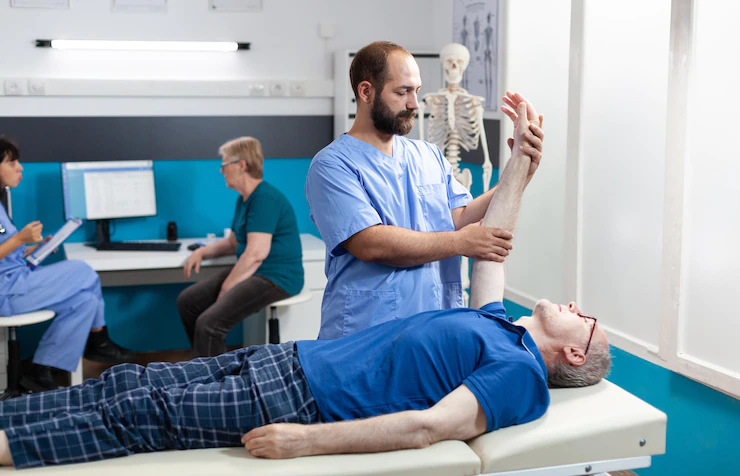An orthopaedist or orthopaedic doctor is a medical professional specially trained to diagnose, treat, and prevent a whole range of musculoskeletal system problems. Orthopaedists treat injuries or conditions that patients experience with daily activities, playing sports, and because of wear and tear over time.
If you’ve been referred to an orthopaedist by your primary care doctor or are planning on seeing an orthopaedist yourself, there’s a lot you want to know before stepping into an orthopaedist’s office.
Let’s talk about some of the things your orthopaedic doctor wants you to know before your visit to get the best out of it and where you can go to find the best orthopaedic treatment in Texas.
If you are suffering from musculoskeletal problems, visit Specialty Care Clinics for better treatment in Texas. Our orthopaedists will diagnose the condition and then proceed with suitable treatment. The doctors try to treat the conditions with non-surgical options if possible. In some cases where non-surgical treatment does not apply, they recommend surgery if required. Our clinics have electronic devices required for the diagnosis and treatment of musculoskeletal conditions. To book an appointment with us dial 469-545-9983.
- Healing takes time : As a patient, you need to understand that there is no magic pill or overnight solution to your musculoskeletal condition or injury. Your orthopaedist’s treatment plan will take time to work and heal you completely. Therefore, you must patiently work together with your orthopaedic doctor to make sure that your healing is as effective as possible.
- Advocate for yourself : While your orthopaedic doctor will guide you through everything suitable to your case, if you think something is still unclear or overlooked, don’t hesitate to ask the orthopaedist. You need to utilize patient rights and know your diagnosis, why symptoms are getting worse, and what treatment will look like.

Surgery is the last resort
Many people think they will have to undergo surgery for treatment because they are going to see an orthopaedist. But this is far from the truth. Some injuries and orthopaedic conditions require surgery, but surgery is not always necessary.
Before considering surgery, orthopaedists recommend non-surgical treatment options first. The most commonly recommended non-surgical treatment options include medications, cortisone injections, physical therapy, massage therapy, PRP therapy, and more. Orthopaedic surgery is considered when all non-invasive methods fail to make you feel better and heal the injury.
Early treatment can help heal faster
Your orthopaedist wants you to know that neglecting your pain, discomfort, and other symptoms will get you nowhere. In fact, your delay in seeking treatment will result in much longer treatment and recovery time. In fact, most musculoskeletal problems worsen over time. For example, a partially torn tendon can tear completely if not treated immediately.
In addition, a previously diagnosed problem can often be treated with non-invasive methods. But if you delay treatment and let the wound or problem get worse, you may need surgery, which is the only treatment to fix your problem.

Some musculoskeletal injuries can be prevented
It is undeniable that musculoskeletal injuries occur without warning. However, there are many things you can do to prevent these injuries from happening.
Your orthopaedic surgeon wants you to take the necessary precautions in your daily decisions to ensure that you stay at your best and injury-free. For example, your orthopaedic surgeon wants you to maintain a healthy weight because many musculoskeletal injuries occur when your bones and joints bear more weight than they can handle.
Not just that, but they also want you to :
- Stay active and exercise
- Eat foods that are good for the bones
- Cut down on unhealthy foods and drinks
- Sleep well
Take notes
Your orthopaedic doctor may go into depth about your condition. So when you visit your orthopaedist or bring someone for help remember all the important points about your musculoskeletal diagnostic reports. If you cannot bring someone with you, carry notes. Then present them to your doctor to make sure you covered everything.

Chronic pain sufferers should see an orthopaedic doctor
Chronic pain will not go away on its own if left untreated. Ignoring the symptoms and not seeing an orthopaedic surgeon can exacerbate the painful situation and affect mobility and even independence. The sooner you get treatment, the better your condition will be.
Visit Specialty Care Clinics for the best orthopaedic care services in Texas. Call (469) 545-9983 to book an appointment.
